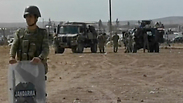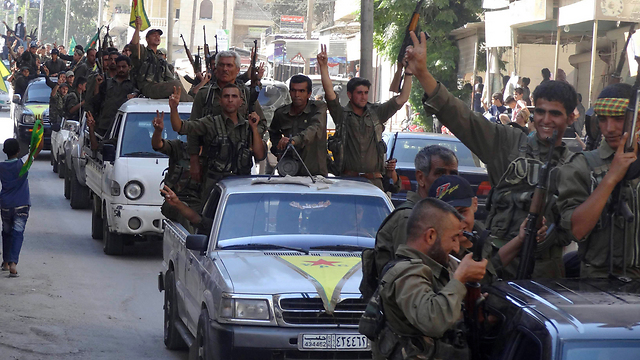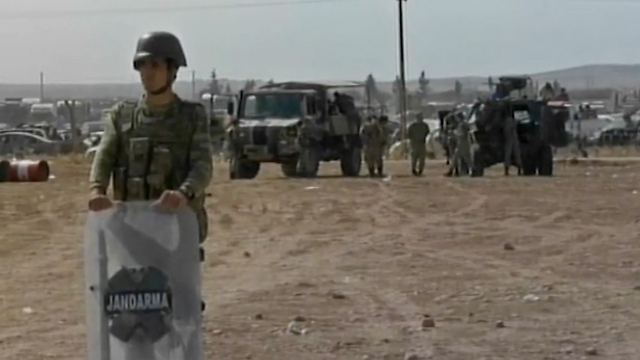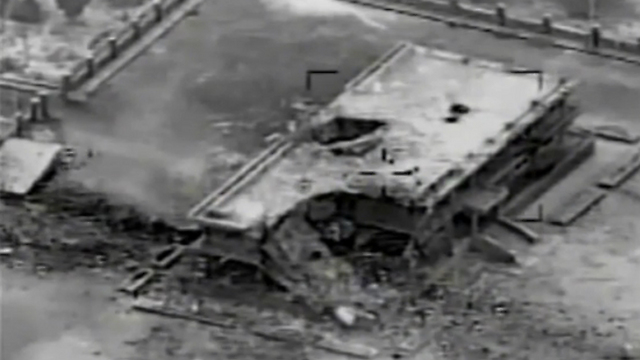
Report: Syrian army retakes area northeast of Damascus
Battles rage across Syria, with US air strikes hitting oil fields in north and east Syria, Kurdish forces beating Islamic State militants, as France and UK mull military intervention.
Meanwhile, as France and the UK mull their roll in a US-led military campaign against the Islamic State group in Syria, scores of the group's members were killed in clashes with Kurdish forces in northern Syria. The group also suffered addional losses in US airstrikes on oil fleids controled by the radical group.
The area - Adra al-Omalia - is around 30 km (19 miles) from central Damascus but far from parts of Syria where the United States has launched air strikes against Islamic State militants.
"The Syrian Army takes full control of the town of Adra al-Omalia in the eastern countryside of Damascus," al-Manar said in a news flash.
Assad's forces, backed by the Lebanese Shi'ite terror movement Hezbollah, have been gradually extending control over a corridor of territory from Damascus to the Mediterranean coast this year, seizing towns and villages along the main north-south highway and in the mountainous Qalamoun along the Lebanese border.
The Britain-based Syrian Observatory for Human Rights, which monitors the conflict, said at least 29 people - 18 of them rebel fighters - died during fighting on Wednesday between insurgents and government forces in the outskirts of Damascus.
Kurdish front
Officials said Islamic State had concentrated their fighters south of Kobani late on Wednesday and had pushed towards the town but Kurdish YPG forces repelled them.
Islamic State launched a fresh offensive to try to capture Kobani more than a week ago after months of fighting. More than 100,000 Kurds have fled the town and surrounding villages, crossing over the nearby border into Turkey.
"The YPG responded and pushed them back to about 10-15 km (6-9 miles) away," Idris Nassan, deputy minister for foreign affairs in the Kobani canton, told Reuters by telephone.
Ocalan Iso, a Kurdish defence official, confirmed that YPG forces had stemmed Islamic State's advances south of Kobani, known as Ayn al-Arab in Arabic.
"As our fighters secured the area, we found 12 Islamic State bodies," he said by telephone. Islamic State fighters also remain to the east and west of the town and fighting continues in the south.
US attacks as France, UK mull role
Activists say that US-led airstrikes have targeted Syrian oil installations held by the militant Islamic State group, killing at least five people.
The Britain-based Syrian Observatory for Human Rights and two local activist collectives say the airstrikes hit refineries and oil fields in the eastern provinces of Deir el-Zour and Hassakeh.
In one incident, the activists said at least five people were killed, including women and children who were likely the wives and children of militants, living near a refinery building.
The Observatory and activists said other airstrikes targeted the Nusra Front, a Syrian al-Qaida affiliate that has fought the Islamic State, and which is one of the most powerful groups fighting to overthrow Syrian President Bashar Assad.
Other strikes targeted Islamic State compounds, checkpoints and military vehicles.
France's possible participation in air strikes on Islamic State targets in Syria is "on the table", Defence Minister said on Thursday, hours after President Francois Hollande ruled out such strikes.
France has joined the coalition bombing of Islamic State targets in Iraq on the basis it was asked for help by Baghdad, but has refrained from doing so in Syria, instead supporting the moderate opposition against Syrian President Bashar al-Assad.
French fighter jets struck targets in Iraq on Thursday, government spokesman Stephane Le Foll said. "There were strikes in Iraq this morning," Le Foll said without giving any further details.
The strikes were the first by French jets since Sept. 19 when Paris joined the United States military action against Islamic State insurgents in Iraq who have taken over parts of the country.
But Defence Minister Le Drian told RTL Radio when asked about the possibility France might join raids in Syria: "The opportunity is not there today. We already have an important task in Iraq and we will see in the coming days how the situation evolves."
Pressed further on whether it was a possibility in future, Le Drian - who is taking part in a war cabinet meeting with Hollande on Thursday - said: "The question is on the table".
The British prime minister said late Wednesday he will ask Parliament to approve joining international airstrikes against the Islamic State group in Iraq.
David Cameron announced the move in his address to the UN General Assembly.
Cameron did not mention the prospect of also joining the US-led international airstrikes against the Islamic State group in Syria that began this week.
The threat of the terror group's grip on large parts of both Iraq and Syria has dominated this week's annual gathering of world leaders.
Cameron also warned against believing that it's necessary to "do a deal" with Syrian President Bashar Assad to defeat the Islamic State group, calling that thinking "dangerously misguided." He said the brutality of Assad's government has been a powerful recruiting tool for extremists during the conflict there, which is now in its fourth year.
Assad's government has not asked for international intervention in fighting the Islamic State group, but Iraq has.
The prime minister defended his decision to pursue the UK's involvement in airstrikes in Iraq, saying that the Islamic State group's threat is global and that "when the safety and security of our people is at stake, we must be uncompromising in our response."
There are lessons to be learned from the past, including the invasion of Iraq a decade ago, he acknowledged, but "isolation and withdrawing from a problem like ISIL will only make things worse," he said, using one of a number of acronyms for the Islamic State group.
Cameron also said Iran could help in defeating the terror group's threat. He met with Iran's president Wednesday, the first such meeting since the Iranian revolution in 1979.
"They could help secure a more stable, inclusive Iraq; and a more stable, inclusive Syria," Cameron said of Iran, though he acknowledged that disagreements remain on other issues. "And if they are prepared to do this, then we should welcome their engagement."
Reuters and AP contributed to this report













